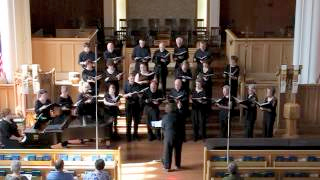by Daniel Hathaway

The concert began on a somber note with John Rutter’s De Profundis from the Requiem. Rutter can channel a number of different romantic composers, and on this occasion, Herbert Howells came to mind more than once in the movement’s quietly ecstatic choral lines. Good Company sang them expressively with fine blend and balance. Cellist Linda Atherton contributed a grippingly resonant cello solo.
The short first half of the program concluded with a lyrical Magnificat attributed to Giovanni Pergolesi, or perhaps Francesco Durante, depending on your scholarly politics. Good Company sang the straightforward, attractive piece with clarity and fine dynamic contrasts. Violinists Mary Beth Ions and Carol Ruzicka joined cellist Linda Atherton and organist Patrick Wickliffe in a stylish instrumental accompaniment, and the able soloists were Holly Walker, Melissa Jones, Carlos Castella-Hogan and Linda Burgess.
Continuo madrigals from Monteverdi’s eighth book opened the second half. Though not all pieces conceived for one singer on a part adapt well to multiple performers, Ardo avvampo and Dolcissimo uscignolo responded beautifully to full choral treatment. Ardo burned with passion until all turned to ashes, leaving soloists Ryan Pennington and Don Ferencz stranded at the end. Before that, the Amethyst Trio added fine instrumental color to Monteverdi’s overheated choral parts. Dolcissimo’s soliloquy to a nightingale featured the pure, clear voice of Lauren Owens alternating with the chorus.
Two madrigals by the British-born violist and composer Rebecca Clarke (1886-1879), who emigrated to the US and died in New York, were interesting to hear. Both Philomela (Philip Sidney) and When Cats Run Home and Light is Come (Tennyson) are strophic, each with two stanzas set to the same music. That causes some text dissonance in the first — a wildly chromatic passage on “mournfully bewailing” in the first seems overly dramatic for “daily craving” in the second, but Cats is perfectly happy being a cheerful, two-stanza glee.
Composer and Lakewood native David Conte was on hand to conduct his Elegy for Matthew [Shepard], originally composed in 1999 for the New York Gay Men’s Chorus, here sung in an arrangement for mixed chorus and piano. The piece sets a two-stanza poem by John Stirling Walker which Conte said was written in the space of an hour. He added that the first stanza was a mnemonic based on “MatthewS” and pointed out that the second was a single sentence and should be read that way (though he ended up setting it with a gap in the middle). The work is dramatic and dissonant at the beginning and goes on to underline the text with rather abstract music. Good Company sang the piece with precision and commitment and Wickliffe was in full possession of the tricky piano score.
Matt Carlson, composer of Shakespeare’s Sonnet 29, couldn’t be present on Sunday — he was busy graduating from Gettysburg College. His brief setting of When, in disgrace of fortune and men’s eyes showed a promising, individual voice in its tight-textured, near-close harmonies.
The remaining works on the second half were just fun. Emma Lou Diemer’s Three Madrigals, all settings of songs from Shakespeare’s plays, were cheerful, uncomplicated musical embellishments of charming texts. Miniatures by Eric Whitacre (a favorite Good Company composer) ended the afternoon. The chorus wittily tossed off his Animal Crackers, Vol. I, three epigrammatic settings of Ogden Nash doggerel that lasted only a few minutes but left the large audience smiling.
The attractive printed program superimposed full texts of the pieces over shadowy illustrations, a nice design touch. A staple or two to hold those pages together would have been a good practical idea.
Published on ClevelandClassical.com May 23, 2013
Click here for a printable version of this article.


